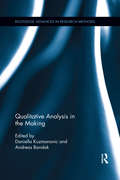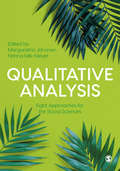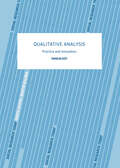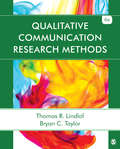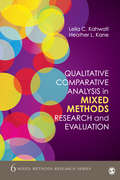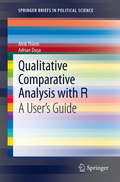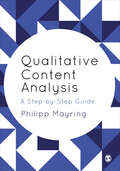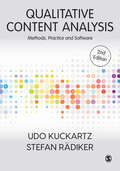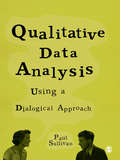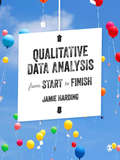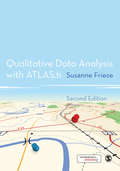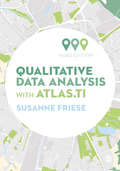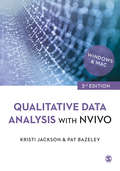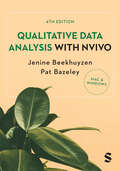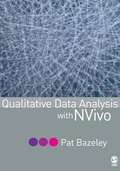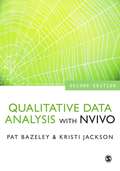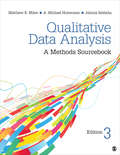- Table View
- List View
Qualitative Analysis in the Making (Routledge Advances in Research Methods #11)
by Daniella Kuzmanovic Andreas BandakHow do scholars transform qualitative data into analysis? What does making analysis imply? What happens in the space in-between data and finalized analysis is notoriously difficult to talk about. In other parts of the research process, scholars and students are aided by method books that describe the technicalities of generating, processing and sorting through data, handbooks that teach academic writing, and scholarly works that offer meta-level, theoretical perspectives. Yet the path from qualitative data to analysis remains ‘a black box.’ Qualitative Analysis in the Making ventures into this black box. The volume provides a means of speaking about how analyses emerge in the Humanities. Contributors from disciplines such as anthropology, history, and sociology of religion all employ an analytical double take. They revisit one of their analyses, analyzing how this particular analysis came into being. Such analyses of an analysis are neither confessions nor step-by-step recounts of what happened. Rather, the volume argues that speaking of the space in-between requires analytical displacement, and the employment of fresh analytical takes. This approach contributes to demystifying the path from qualitative data to finalized analysis. It invites novel epistemological reflections among scholars, and assists students in improving their analytical skills.
Qualitative Analysis: Eight Approaches for the Social Sciences
by Nanna Mik-Meyer Margaretha JärvinenIntroducing eight analytical approaches that are key to successful social science research, this book helps you get to grips with theory and apply it to qualitative analysis. With two &‘matched chapters&’ dedicated to each approach, it provides a balance between theory and analytical method. The first chapter grounds the approach in theory and the second uses real-world examples to show how to conduct your own analysis using the approach. Drawing on the contributing authors&’ wealth of experience, the book: · Highlights how analysis relates to the entire research process and helps you position your analysis within the larger context of your research · Provides a strong, theoretical foundation for building good qualitative analysis · Guides you through translating theory into real-world practice in your own research Detailed, clear and accessible, this book is perfect for students who want to understand the theory behind qualitative analysis before conducting their own research, or develop their understanding of specific approaches.
Qualitative Analysis: Eight Approaches for the Social Sciences
by Nanna Mik-Meyer Margaretha JärvinenIntroducing eight analytical approaches that are key to successful social science research, this book helps you get to grips with theory and apply it to qualitative analysis. With two &‘matched chapters&’ dedicated to each approach, it provides a balance between theory and analytical method. The first chapter grounds the approach in theory and the second uses real-world examples to show how to conduct your own analysis using the approach. Drawing on the contributing authors&’ wealth of experience, the book: · Highlights how analysis relates to the entire research process and helps you position your analysis within the larger context of your research · Provides a strong, theoretical foundation for building good qualitative analysis · Guides you through translating theory into real-world practice in your own research Detailed, clear and accessible, this book is perfect for students who want to understand the theory behind qualitative analysis before conducting their own research, or develop their understanding of specific approaches.
Qualitative Analysis: Practice And Innovation
by Douglas EzzyOffering a detailed introduction to the practice of data analysis, this book is both user-friendly and theoretically grounded. Drawing on his extensive experience of qualitative research, Douglas Ezzy reviews approaches to data analysis in established research traditions including ethnography, phenomenology and symbolic interactionism, alongside the newer approaches informed by cultural studies and feminism. He explains the difference between inductive, deductive and abductive theory building, provides a guide to computer-assisted analysis and outlines techniques such as journal writing, team meetings and participant reviews.This text is one of the first to treat computer assisted data analysis as an integral part of qualitative research. Exceptionally well written, this is a valuable reference for research students and professional researchers in the social sciences and health.
Qualitative Communication Research Methods (Fourth Edition)
by Thomas R. Lindlof Bryan C. TaylorQualitative Communication Research Methods, Fourth Edition introduces you to qualitative research in speech and mass communication. Award-winning scholars and authors Thomas R. Lindlof and Bryan C. Taylor guide you through every step of the qualitative process, from developing research topics and questions through writing a final report. You are given numerous examples of work in the field to illustrate how studies are designed, carried out, written, evaluated, and related to theory. In addition to covering the theories and methods currently used in qualitative communication research, the authors also discuss important trends influencing the future of that research, helping you make informed judgments about the significance and consequences of recent trends.
Qualitative Comparative Analysis Using R: A Beginner's Guide (Methods for Social Inquiry)
by Carsten Q. Schneider Eva Thomann Ioana-Elena OanaA comprehensive introduction and teaching resource for state-of-the-art Qualitative Comparative Analysis (QCA) using R software. This guide facilitates the efficient teaching, independent learning, and use of QCA with the best available software, reducing the time and effort required when encountering not just the logic of a new method, but also new software. With its applied and practical focus, the book offers a genuinely simple and intuitive resource for implementing the most complete protocol of QCA. To make the lives of students, teachers, researchers, and practitioners as easy as possible, the book includes learning goals, core points, empirical examples, and tips for good practices. The freely available online material provides a rich body of additional resources to aid users in their learning process. Beyond performing core analyses with the R package QCA, the book also facilitates a close integration with the R package SetMethods allowing for a host of additional protocols for building a more solid and well-rounded QCA.
Qualitative Comparative Analysis in Mixed Methods Research and Evaluation (Mixed Methods Research Series #6)
by Leila Kahwati Heather KaneQualitative Comparative Analysis in Mixed Methods Research and Evaluation provides a user-friendly introduction for using Qualitative Comparative Analysis (QCA) as part of a mixed methods approach to research and evaluation. Offering practical, in-depth, and applied guidance for this unique analytic technique that is not provided in any current mixed methods textbook, the chapters of this guide skillfully build upon one another to walk researchers through the steps of QCA in logical order. To enhance and further reinforce learning, authors Leila C. Kahwati and Heather L. Kane provide supportive learning objectives, summaries, and exercises, as well as author-created datasets for use in R via the companion site. Qualitative Comparative Analysis in Mixed Methods Research and Evaluation is Volume 6 in SAGE’s Mixed Methods Research Series. To learn more about each text in the series, please visit sagepub.com/mmrs.
Qualitative Comparative Analysis in Mixed Methods Research and Evaluation (Mixed Methods Research Series #6)
by Leila Kahwati Heather KaneQualitative Comparative Analysis in Mixed Methods Research and Evaluation provides a user-friendly introduction for using Qualitative Comparative Analysis (QCA) as part of a mixed methods approach to research and evaluation. Offering practical, in-depth, and applied guidance for this unique analytic technique that is not provided in any current mixed methods textbook, the chapters of this guide skillfully build upon one another to walk researchers through the steps of QCA in logical order. To enhance and further reinforce learning, authors Leila C. Kahwati and Heather L. Kane provide supportive learning objectives, summaries, and exercises, as well as author-created datasets for use in R via the companion site. Qualitative Comparative Analysis in Mixed Methods Research and Evaluation is Volume 6 in SAGE’s Mixed Methods Research Series. To learn more about each text in the series, please visit sagepub.com/mmrs.
Qualitative Comparative Analysis with R
by Adrian Dusa Alrik ThiemSocial science theory often builds on sets and their relations. Correlation-based methods of scientific enquiry, however, use linear algebra and are unsuited to analyzing set relations. The development of Qualitative Comparative Analysis (QCA) by Charles Ragin has given social scientists a formal tool for identifying set-theoretic connections based on Boolean algebra. As a result, interest in this method has markedly risen among social scientists in recent years. This book offers the first complete introduction on how to perform QCA in the R software environment for statistical computing and graphics with the QCA package. Developed as a comprehensive solution, QCA provides an unprecedented scope of functionality for analyzing crisp, multi-value and fuzzy sets. The reader is not required to have knowledge of R, but the book assumes an understanding of the fundamentals of QCA. Using examples from published work, the authors demonstrate how to make the most of QCA's wide-ranging capabilities for the reader's own purposes. Although mainly written for political scientists, this book is also of interest to scholars from other disciplines in the social sciences such as sociology, business, management, organization, anthropology, education and health.
Qualitative Content Analysis: A Step-by-Step Guide
by Philipp MayringIn eight clear-cut steps, this book provides a systematic introduction to qualitative content analysis and how you can use it in each stage of your research project, no matter the type or amount of data. Developed by a leading expert in the field and based on years of teaching experience, this book offers an essential framework for interpreting qualitative data for any social sciences student or researcher. To support you in choosing the best approach for your research, this book includes: · Examples of how QCA can be applied to various research processes · An introduction to text analysis and its different approaches · Discussions of how to use QCA software to benefit your research · An online how-to manual to help you get the most out of QCAmap software. It also introduces the process of scientific research, and integrates qualitative and quantitative analysis into the step-by-step approach.
Qualitative Content Analysis: A Step-by-Step Guide
by Philipp MayringIn eight clear-cut steps, this book provides a systematic introduction to qualitative content analysis and how you can use it in each stage of your research project, no matter the type or amount of data. Developed by a leading expert in the field and based on years of teaching experience, this book offers an essential framework for interpreting qualitative data for any social sciences student or researcher. To support you in choosing the best approach for your research, this book includes: · Examples of how QCA can be applied to various research processes · An introduction to text analysis and its different approaches · Discussions of how to use QCA software to benefit your research · An online how-to manual to help you get the most out of QCAmap software. It also introduces the process of scientific research, and integrates qualitative and quantitative analysis into the step-by-step approach.
Qualitative Content Analysis: Methods, Practice and Software
by Udo Kuckartz Stefan RadikerAre you working with qualitative data but unsure how to approach your analysis? This hands-on guide to qualitative content analysis from two internationally renowned experts provides you with a clear strategy for analysing your data, whether you are working with social media content, field notes, images, narratives or focus group data. Using qualitative interviews as an example, the book provides a clear structure for approaching your analysis that can be adapted for your research project. Explaining how qualitative content analysis differs from quantitative methods, the book provides you with: •a solid understanding of the principles behind QCA •a step-by-step guide to three types of QCA •guidance on how you can use software to enhance your analysis.
Qualitative Content Analysis: Methods, Practice and Software
by Udo Kuckartz Stefan RadikerAre you working with qualitative data but unsure how to approach your analysis? This hands-on guide to qualitative content analysis from two internationally renowned experts provides you with a clear strategy for analysing your data, whether you are working with social media content, field notes, images, narratives or focus group data. Using qualitative interviews as an example, the book provides a clear structure for approaching your analysis that can be adapted for your research project. Explaining how qualitative content analysis differs from quantitative methods, the book provides you with: •a solid understanding of the principles behind QCA •a step-by-step guide to three types of QCA •guidance on how you can use software to enhance your analysis.
Qualitative Data Analysis Using a Dialogical Approach
by Dr Paul SullivanIn this important new text, Paul Sullivan introduces readers to a qualitative methodology rooted in the analysis of dialogue and subjectivity: the dialogical approach. Sullivan unpacks the theory behind a dialogical approach to qualitative research, and relates issues of philosophy and methodology to the practical process of actually doing qualitative research. Sullivan's book foregrounds the role of atmosphere, subjectivity and authorial reflection within texts. His work also enables the researcher to attend to the conflicts, judgments and interpretive activities that take place in language use. Practically speaking, the dialogical approach enables analysis of direct and indirect discourse, speech genres, hesitations, irony and a variety of other conditions that shape our understanding of dialogue in context. As well as exploring the theory behind this innovative method, Sullivan provides sound practical advice that recognises the everyday analytic needs of the reader. Topics include: * The theoretical foundations of the approach * The role of subjectivity in qualitative research * Data preparation and analysis * The future of the approach Theoretical discussion is consistently accompanied by research examples and suggestions as to how the dialogical approach could be used in the reader's own research. This important and timely book is ideal for any reader who wants to do research with dialogue and who is keen to attend to the full nuances and complexities of discourse.
Qualitative Data Analysis from Start to Finish
by Jamie HardingAre you new to qualitative research? Are you planning to do interviews or focus groups and wondering what on earth you'll do with the data once it's collected? Do you have a pile of transcripts staring at you right now and are you lost as to how to identify themes, code your data and work out what it all means? Fear not, help is here! In this brilliant new book, Jamie Harding breaks down the process of analysing qualitative data into simple, retraceable steps. After providing some top tips for designing your research and collecting your data, he takes you through the different stages of analysis, from the first reading of your transcripts, to presenting your findings in a report or dissertation. For each stage of the process there are demonstrations using real data and exercises for you to perform yourself. He unpicks what happens behind the scenes in qualitative data analysis - the bit that's hard to learn without seeing it happen and trying it for yourself. While acknowledging that there are many different forms that qualitative data analysis can take, the book provides a series of ideas and examples that you will find invaluable when analysing your own data. This book is perfect for all social science students who are struggling with data analysis and are looking for someone to guide the way.
Qualitative Data Analysis with ATLAS.ti
by Susanne FrieseQualitative Data Analysis with ATLAS.ti is the very first book designed to guide you step-by-step through your research project using ATLAS.ti. In the book, you will find clear, practical advice on preparing your data, setting up a new project in ATLAS.ti, developing a coding system, asking questions, finding answers and preparing your results. The book features: - methodological as well as technical advice - numerous practical exercises and examples - screenshots showing you each stage of analysis - a companion website with online tutorials and data sets Susanne Friese teaches qualitative methods at the University of Hanover and at various PhD schools, provides training and consultancy for ATLAS.ti at the intersection between developers and users.
Qualitative Data Analysis with ATLAS.ti
by Susanne FrieseNow updated to cover latest versions and featuring instructions for both Mac and Windows users, this book is still the go-to source of support for getting to grips with qualitative data analysis using ATLAS.ti. With over twenty years of experience using, developing, and teaching ATLAS.ti, Susanne Friese is the perfect data analysis tour guide. Aware of common challenges and sticking points, she eases readers from readying and organizing data into coding and querying it, providing not only tips on how to prepare for analysis, but also the tools and technical know-how needed to observe, examine, and discuss data. Placing quick software ‘skills training’ tutorials alongside different stages of the data analysis process, she gives readers the opportunity to integrate software training with their actual analysis.
Qualitative Data Analysis with ATLAS.ti
by Susanne FrieseNow updated to cover latest versions and featuring instructions for both Mac and Windows users, this book is still the go-to source of support for getting to grips with qualitative data analysis using ATLAS.ti. With over twenty years of experience using, developing, and teaching ATLAS.ti, Susanne Friese is the perfect data analysis tour guide. Aware of common challenges and sticking points, she eases readers from readying and organizing data into coding and querying it, providing not only tips on how to prepare for analysis, but also the tools and technical know-how needed to observe, examine, and discuss data. Placing quick software ‘skills training’ tutorials alongside different stages of the data analysis process, she gives readers the opportunity to integrate software training with their actual analysis.
Qualitative Data Analysis with NVivo
by Dr. Kristi Jackson Dr. Pat BazeleyEngaging and accessible, this book offers students a complete guide to using NVivo for qualitative data analysis. Drawing on their wealth of expertise, the authors offer detailed, practical advice that relates to students’ own experience and research projects. Packed with real-world examples and case studies, the book supports students through every stage of qualitative data analysis. The Third Edition: Contains fully integrated instructions for using NVivo on both Mac and PC, with screenshots and click-by-click guidance. Seamlessly interweaves theory and practice in easy-to-follow steps. Empowers students to develop their critical thinking. Accompanied by video tutorials for both Mac and PC, web links and a host of other helpful online resources, this step-by-step book removes students' anxiety about tackling data analysis. Whether for advanced researchers or those approaching the task for the first time, this clear, yet comprehensive guide is the perfect companion for anyone doing qualitative data analysis with NVivo.
Qualitative Data Analysis with NVivo
by Dr. Kristi Jackson Dr. Pat BazeleyEngaging and accessible, this book offers students a complete guide to using NVivo for qualitative data analysis. Drawing on their wealth of expertise, the authors offer detailed, practical advice that relates to students’ own experience and research projects. Packed with real-world examples and case studies, the book supports students through every stage of qualitative data analysis. The Third Edition: Contains fully integrated instructions for using NVivo on both Mac and PC, with screenshots and click-by-click guidance. Seamlessly interweaves theory and practice in easy-to-follow steps. Empowers students to develop their critical thinking. Accompanied by video tutorials for both Mac and PC, web links and a host of other helpful online resources, this step-by-step book removes students' anxiety about tackling data analysis. Whether for advanced researchers or those approaching the task for the first time, this clear, yet comprehensive guide is the perfect companion for anyone doing qualitative data analysis with NVivo.
Qualitative Data Analysis with NVivo
by Pat Bazeley Jenine BeekhuyzenLooking to use NVivo in your qualitative research? With easy-to-use instructions and screenshots for both Windows and Mac users, this book first covers the basics of coding in NVivo before helping you extend your knowledge and confidence using the software. But this is more than just a ‘how to’ software manual. Each chapter offers rich, methodological discussions that interweave qualitative thinking with technology, enabling you to develop a sophisticated research practice. Starting with how to navigate the software before moving on to different types of data you might use - such as text, images, and social media data - and how to code and visualise that data, each chapter helps you develop your skill in using NVivo to support effective qualitative analysis. The book also: Helps you understand why and when to use NVivo tools and how to combine them creatively; Includes a new chapter on visualising and reporting on your data using NVivo; Provides practical support for using NVivo 14, including fully updated screenshots, click-by-click instructions, screencast videos, and datasets for you to try what you’ve learned. Designed for anyone who wants to use NVivo in their research, this book is the go-to for conducting robust qualitative data analysis.
Qualitative Data Analysis with NVivo
by Pat Bazeley Jenine BeekhuyzenLooking to use NVivo in your qualitative research? With easy-to-use instructions and screenshots for both Windows and Mac users, this book first covers the basics of coding in NVivo before helping you extend your knowledge and confidence using the software. But this is more than just a ‘how to’ software manual. Each chapter offers rich, methodological discussions that interweave qualitative thinking with technology, enabling you to develop a sophisticated research practice. Starting with how to navigate the software before moving on to different types of data you might use - such as text, images, and social media data - and how to code and visualise that data, each chapter helps you develop your skill in using NVivo to support effective qualitative analysis. The book also: Helps you understand why and when to use NVivo tools and how to combine them creatively; Includes a new chapter on visualising and reporting on your data using NVivo; Provides practical support for using NVivo 14, including fully updated screenshots, click-by-click instructions, screencast videos, and datasets for you to try what you’ve learned. Designed for anyone who wants to use NVivo in their research, this book is the go-to for conducting robust qualitative data analysis.
Qualitative Data Analysis with NVivo
by Pat Bazeley`In plain language but with very thorough detail, this book guides the researcher who really wants to use the NVivo software (and use it now) into their project. The way is lit with real-project examples, adorned with tricks and tips, but it’s a clear path to a project' - Lyn Richards, Founder and Non-Executive Director, QSR International Doing Qualitative Data Analysis with NVivo is essential reading for anyone thinking of using their computer to help analyze qualitative data. With 15 years experience in computer-assisted analysis of qualitative and mixed-mode data, Patricia Bazeley is one of the leaders in the use and teaching of NVivo software. Through this very practical book, readers are guided on how best to make use of the powerful and flexible tools offered by the latest version of NVivo as they work through each stage of their research projects. Explanations draw on examples from her own and others' projects, and are supported by the methodological literature. Researchers have different requirements and come to their data from different perspectives. This book shows how NVivo software can accommodate and assist analysis across those different perspectives and methodological approaches. It is required reading for both students and experienced researchers alike.
Qualitative Data Analysis with NVivo (Second Edition)
by Kristi Jackson Patricia BazeleyThis straightforward, jargon-free book provides an invaluable introduction to planning and conducting qualitative data analysis with NVivo. Written by leading authorities, with over 40 years combined experience in computer-assisted analysis of qualitative and mixed-mode data, the new edition of this best selling textbook is an ideal mix of practical instruction, methodology and real world examples. Practical, clear and focused the book effectively shows how NVivo software can accommodate and assist analysis across a wide range of research questions, data types, perspectives and methodologies. It sets out: The power and flexibility of the NVivo software How best to use NVivo at each stage in your research project Examples from the authors' own research and the sample data that accompanies the software, supplemented with vignettes drawn from across the social sciences Annotated screen shots A website with links to data, sample projects, supplementary/updated instructions, and SAGE journal content This second edition contains new chapters on handling a literature review, visualizing data, working in mixed methods and social media datasets, and approaching NVivo as a team. An insightful step-by-step guide to the messy reality of doing computer-assisted analysis, this successful book is essential reading for anyone considering using NVivo software.
Qualitative Data Analysis: A Methods Sourcebook
by Matthew B. Miles Mr Johnny Saldana A. Michael HubermanThe Third Edition of Miles & Huberman's classic research methods text is updated and streamlined by Johnny Saldaña, author of The Coding Manual for Qualitative Researchers. Several of the data display strategies from previous editions are now presented in re-envisioned and reorganized formats to enhance reader accessibility and comprehension. The Third Edition’s presentation of the fundamentals of research design and data management is followed by five distinct methods of analysis: exploring, describing, ordering, explaining, and predicting. Miles and Huberman's original research studies are profiled and accompanied with new examples from Saldaña's recent qualitative work. The book's most celebrated chapter, "Drawing and Verifying Conclusions," is retained and revised, and the chapter on report writing has been greatly expanded, and is now called “Writing About Qualitative Research.” Comprehensive and authoritative, Qualitative Data Analysis has been elegantly revised for a new generation of qualitative researchers.
